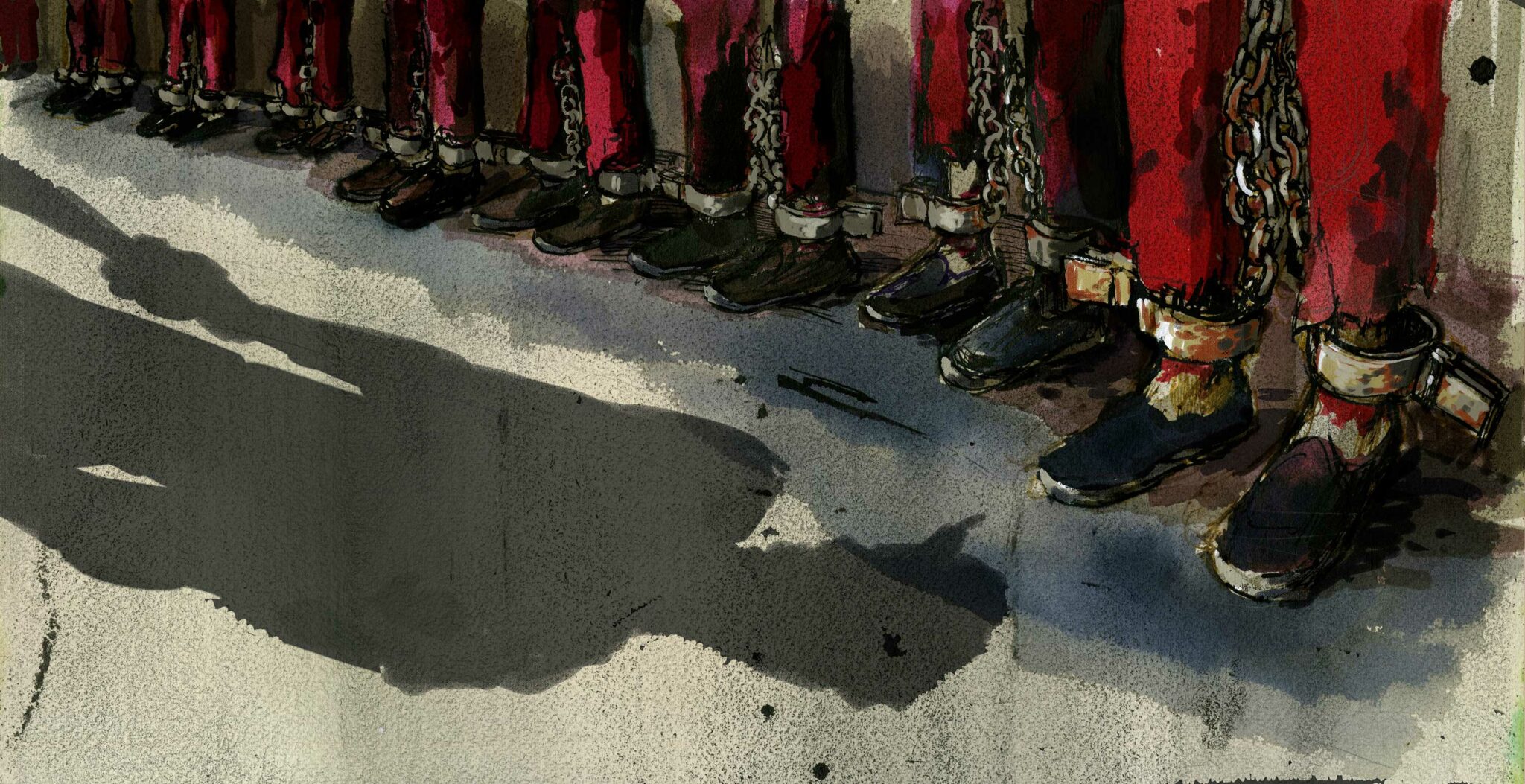Arbitrary detention and enforced disappearance in international law
Under international human rights law, everyone has the right to liberty of person. [[[UDHR, Article 3; ICCPR, Article 9(1).]]] Arrest or detention is permissible only for reasons, and according to procedures, that are established by law. [[[ICCPR, Article 9(1); CERD, Article 17(2)(a).]]] Domestic law authorizing, and setting out the grounds and procedures for, arrest and detention must conform to international standards. [[[Amnesty International, “Fair Trial Manual”, 2014 →]]] Any deprivation of liberty outside the context of criminal charges cannot amount to an evasion of the limits on the criminal justice system by providing the equivalent of criminal punishment without the applicable protections. [[[HRC General Comment 35, §14.]]]
According to the UN Working Group on Arbitrary Detention, arbitrary detention includes:
- situations in which an individual is deprived of their liberty without a clear basis in law;
- cases in which persons are detained solely for the peaceful exercise of certain rights such as the rights to freedom of movement or freedom of thought, conscience, and religion;
- cases of total non-observance of, or sufficiently serious violations of, the right to a fair trial; and
- situations in which the deprivation of liberty constitutes a violation of international law for reasons of discrimination, such as on the basis of ethnic origin, language, religion, or opinion. [[[Working Group on Arbitrary Detention, Deliberation No. 9 concerning the definition and scope of arbitrary deprivation of liberty under customary international law, UN doc. A/HRC/22/44, 24 December 2012, para. 38]]]
Arrest or detention that is arbitrary, or already unlawful under domestic law, is always prohibited under international law and standards. [[[Article 9 of the Universal Declaration, Article 9(1) of the ICCPR; the Human Rights Committee has clarified that the term “arbitrary” in Article 9(1) of the ICCPR must be interpreted broadly to include elements of inappropriateness, injustice, lack of predictability, and due process of law, as well as elements of reasonableness, necessity, and proportionality, and that “[arrest] or detention on discriminatory grounds in violation of Articles 2(1), 3 or 26 is in principle arbitrary”; HRC General Comment 35, §§12, 17; see also HRC General Comment 36, §61; Special Rapporteur on extrajudicial, summary or arbitrary executions, Report to the UN General Assembly, A/69/265, para. 47, and Report to the Human Rights Council, A/HRC/26/36, para. 74.]]] Examples of arbitrary detention further include prolonged detentions without charge or trial and secret, prolonged incommunicado or indefinite detentions without review, and keeping a person in any form of detention without periodic re-evaluation of the justification for continuing the detention. [[[HRC General Comment 35, §§11, 12.]]] The UN Human Rights Committee has called detentions of family members of an alleged criminal who are not themselves accused of any wrongdoing “egregious examples of arbitrary detention” and enforced disappearances “a particularly aggravated form of arbitrary detention”. [[[HRC General Comment 35, §§16, 17.]]] Conditions of detention inappropriate for its purpose can also make detention arbitrary, and denial of access to counsel and family may result in violations of the right to liberty. [[[HRC General Comment 35, §59.]]]
Arbitrary detention facilitates torture and other ill-treatment, enforced disappearances, and other abuses. An important means of preventing these abuses is to ensure that proper grounds and procedures for deprivation of liberty are adhered to at all times, in compliance with international standards.
Policies and procedures allowing arrest and detention based on racial or ethnic profiling must be prohibited. [[[CERD General Recommendation 36 (2020) on preventing and combating racial profiling by law enforcement officials, CERD/C/GC/36, §§40, 53.]]] Counter-terrorism laws targeting one ethnic group are discriminatory and are never permitted. The prohibition of arbitrary detention is also a norm of customary international law and the UN Working Group on Arbitrary Detention has stated that the prohibition constitutes a peremptory norm of international law; this means it cannot be the subject of treaty reservations or derogations but must be respected at all times, including in times of war or other public emergency. [[[Report to the Human Rights Council, Working Group on Arbitrary Detention, UN Doc. A/HRC/22/44 (2012), paras 37-76; see also 4 HRC General Comment 24, §8, HRC General Comment 29, §11.]]]
When anyone is arrested or detained, they must be notified of the reasons for their arrest or detention and of their rights, including their right to legal counsel. [[[ICCPR, Article 9(2).]]] They must be informed promptly of any charges against them. [[[ICCPR, Article 9(2) and Article 14(3).]]] This information is essential to allow persons to challenge the lawfulness of their arrest or detention.
International standards require that anyone arrested or detained be informed of their rights and be provided with an explanation of how they may avail themselves of such rights. These standards variously require notification of rights, including the right to notify a third person, to obtain legal counsel, to receive medical assistance, to challenge the lawfulness of detention, to not incriminate oneself (including having the right to remain silent), and to complain and have recourse for complaints about ill-treatment or conditions. [[[UN Body of Principles for the Protection of All Persons under Any Form of Detention or Imprisonment, G.A. res. 43/173, (1988), Principles 13 and 14; Guidelines 2 §42(c) and 3 §43(i) of the Principles on Legal Aid]]]
Enforced disappearance: The Convention for the Protection of All Persons from Enforced Disappearances (CPED) defines this crime as “the arrest, detention, abduction or any other form of deprivation of liberty by agents of the State or by persons or groups of persons acting with the authorization, support or acquiescence of the State, followed by a refusal to acknowledge the deprivation of liberty or by concealment of the fate or whereabouts of the disappeared person, which place such a person outside the protection of the law.” [[[CPED, Article (2); Although China is not a party to the CPED, it is bound by the prohibition of committing enforced disappearance under customary international law and other human rights treaties of which it is party, such as the Convention against Torture. Furthermore, enforced disappearances include acts prohibited by peremptory norms (jus cogens) of international law, which are legally binding on all states.]]] State authorities are required to take adequate measures to prevent enforced disappearances, and promptly and effectively investigate to establish the fate and whereabouts of respective persons. An enforced disappearance continues to be committed as long as the fate or whereabouts of the person or their remains has not been determined. [[[International Convention for the Protection of All Persons from Enforced Disappearance, Article 8(1)(b).]]] The fact that a person reappears at some point does not negate such a finding for the period of their disappearance. If authorities refuse to acknowledge the detention of these individuals, or acknowledge it but refuse to disclose information about where the detainees are and denying them access to the outside world with the effect of depriving them of the protection of the law, then enforced disappearance is given at some point during or throughout the entire period of detention. In certain circumstances, the crime amounts to a crime against humanity (see Chapter 7). [[[The International Convention for the Protection of All Persons from Enforced Disappearance (Article 5) recognizes that enforced disappearances may constitute crimes against humanity.]]] Amnesty International considers that the prohibition of enforced disappearance is a peremptory norm of general international law (jus cogens).
Victims of enforced disappearance include not only the disappeared person but also any individual who has suffered harm as a direct result of an enforced disappearance. [[[CPED, Article 24(1).]]]. The families of disappeared persons must have a right to fully contribute in the investigations, and their rights must be fully respected in any decisions on remedies. Furthermore, the denial of the right to know the truth about the whereabouts of a victim of enforced disappearance results, in turn, in a form of cruel and inhuman treatment for the immediate family. [[[Human Rights Committee, Edriss El Hassy v. The Libyan Arab Jamahiriya, Communication No. 1422/2005, para. 6.11; see also, Working Group on Enforced or Involuntary Disappearances, General Comment on the Right to the Truth in Relation to Enforced Disappearances, A/HRC/16/48, para. 4.]]]



